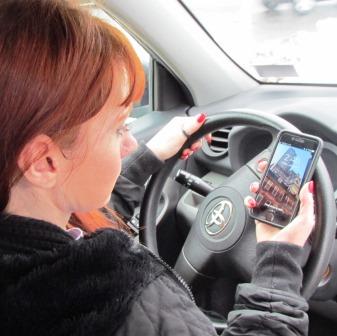
The new Massachusetts hands free law bans drivers from using any and all hand held devices while driving.
The new law, passed before the 2019 holidays actually goes into effect February 23, 2020. It prohibits drivers from using cell phones or any other electronic devices while holding them and driving.
Prior Massachusetts law banned texting and driving. That law, passed in 2010, prohibited all drivers from texting and driving and banned cell phone use by 16 and 17 year olds. But lawmakers decided that version didn’t go far enough.
The kicked-up Massachusetts law bans the use of all electronic devices including cell phones and tablets by operators of motor vehicles and bicycles unless the gizmo is being used hands free.
Drivers can comply with new Massachusetts law if they use any hands-free technology. Speakerphone, voice-to-text and Bluetooth comply with the law. Touching, typing, scrolling or otherwise using or holding the device all violate the new regulations.
What are the penalties for violating the new Massachusetts hands free law?
Those caught violating the Massachusetts hands free law face an escalating scale of fines:
- The first offense brings a $100.00 fine.
- A second offense will cost $250.00.
- Any offense after that brings the potential of a $500.00 ticket.
First and second offenses do not qualify as surchargeable events. That means your auto insurance rates will not increase. But the law does make third and subsequent offenses surchargeable incidents. That means the insurance company can jack up your rates.
In addition, drivers committing a second or subsequent offense must complete a program on “driver attitude”. The law describes the mandatory program as one encouraging a change in driver behavior and attitude about distracted driving.
The good news comes in the fact that the Commonwealth promises that police will only issue warnings at first. Actual fines go into effect only on and after April 1, 2020. That gives drivers time to get used to the new law.
Can drivers touch the phone under the Massachusetts Hands Free Law?
One interesting twist under the law allows drivers to touch the phone or other device once. But the one-free-touch rule applies only if the one touch activates the “hand-free” feature.
Language from the actual law defines “hands free”:
Hands-free mode: operation of a mobile electronic device by which a user engages in a voice communication or receives audio without touching or holding the device; provided, however, that a mobile electronic device may require a single tap or swipe to activate, deactivate or initiate the hands-free mode feature.”
House Bill 4203, enacted November, 2019
Five Do’s and Don’ts under the Massachusetts law:
- Drivers may not look at the device while driving to read or view test, images or video displayed on a mobile electronic device.
- Drivers may view maps generated by GPS or other “navigational system” but only if the device is mounted to the dashboard, windshield or center console.
- Mobile electronic devices may be used in-hand while driving only in response to a true emergency including a need for medical assistance or a valid call for police or file.
- Law allows handheld use only if the vehicle is both stationary and not located in a public travel lane or a bicycle lane, but is not allowed at red lights or stop signs.
- The law does not apply to public safety personnel or emergency first responders using a mobile electronic device while operating an emergency vehicle and engaged in the performance of their duties.
A final point cautions that nothing in the new Massachusetts hands free law authorizes law enforcement to confiscate mobile electronic devices.
Will Police Profile Drivers?
The law requires the registry of motor vehicles to collect data from all citations issued under the hand-free provisions. Annually such data must be sent to a university or other institution for analysis. Among other goals the law aims to determine whether racial or gender profiling results from vehicle stops. If so, guilty law enforcement agencies face specialized training.
Using a cell phone while driving creates enormous potential for deaths and injuries on U.S. roads. In 2017 alone, 3,166 people were killed in motor vehicle crashes involving distracted drivers.
National Highway Safety Administration
For information on New Hampshire’s hands-free law, click here.
Serious injuries can and do result from carelessness on the part of drivers. Thoughtless drivers think texting and babbling on the phone are no big deal. But more and more studies confirm that it takes only a moment of inattentiveness to cause serious injuries in a car accident. The Law Offices of Andrew D. Myers are ready to assist you if you or a loved one has been injured in a car accident caused through no fault of your own. Contact us through the “Schedule a Consultation” tab on this page or call one of the numbers at the top of this page.
Sources:
Chapter 122 of the Acts of 2019
Distracted Driving in Fatal Crashes, NHTSA, Published April, 2019. DOT publication DOT HS 812 700.
Massachusetts General Laws Chapter 90 § 63.
Text of Massachusetts House Bill H4203, enacting the new Massachusetts hands free law.
Visits: 101




